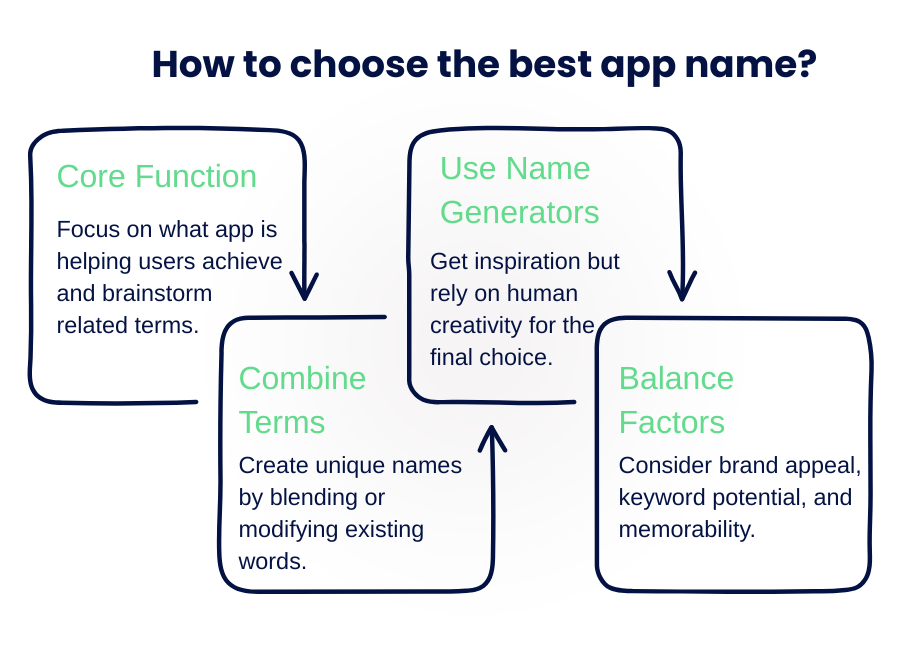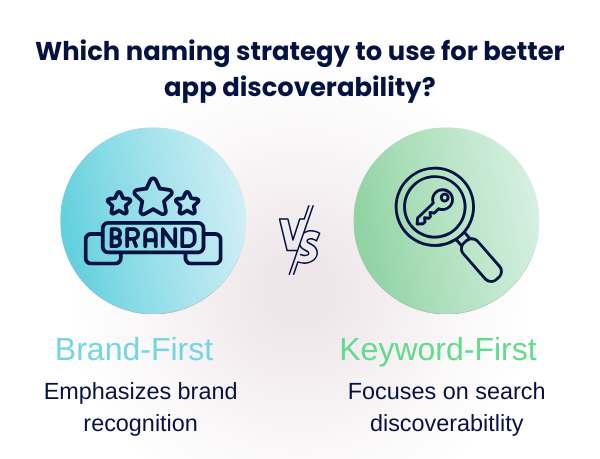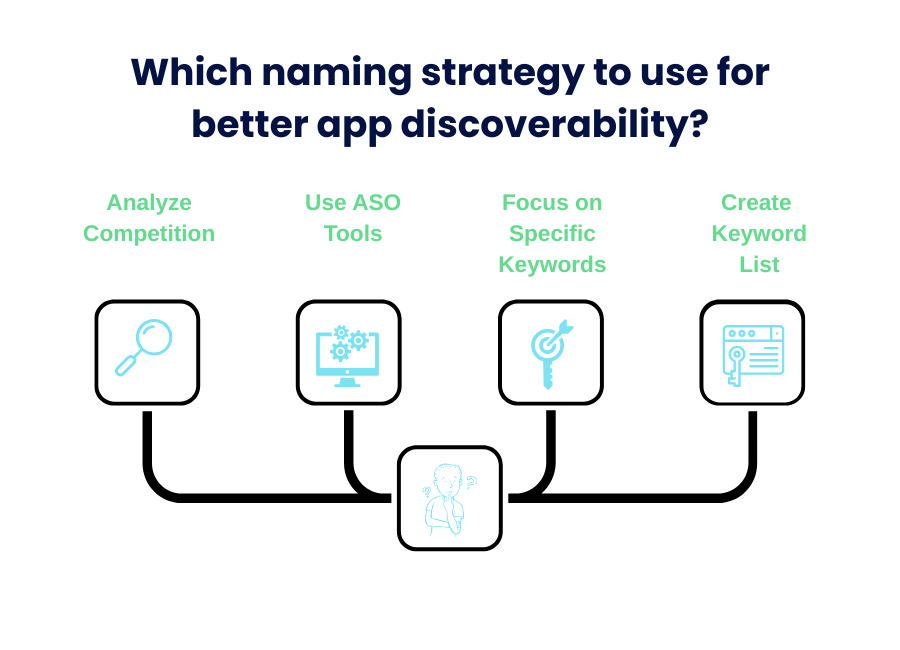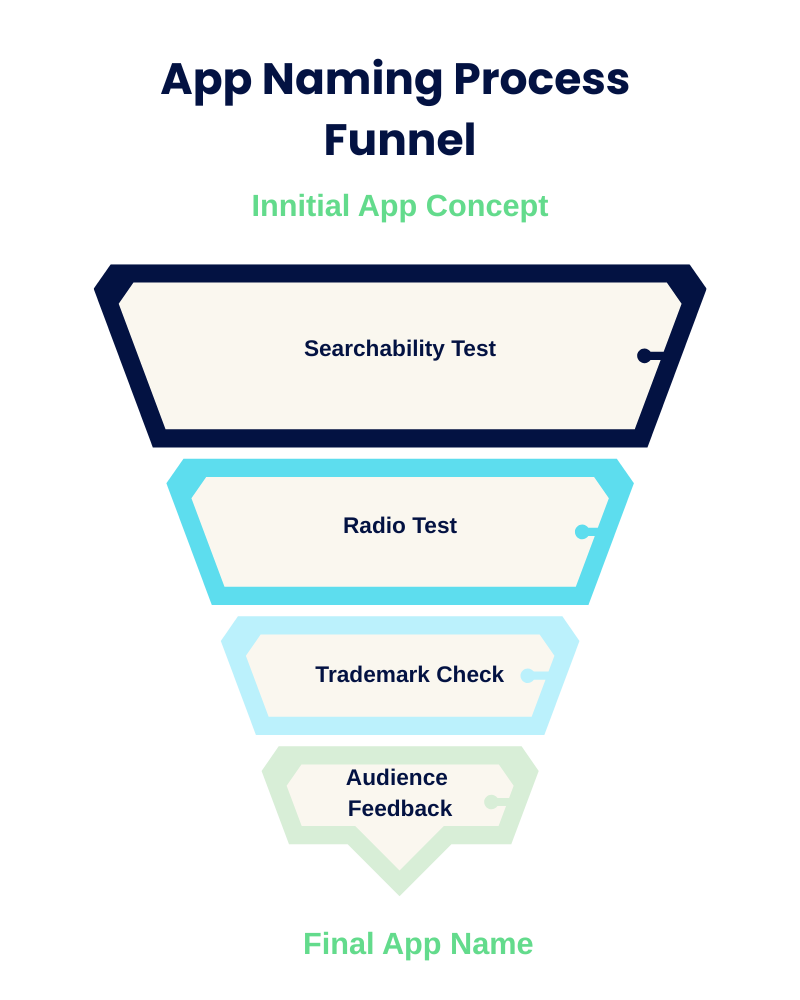In the crowded app marketplace, your app's name isn't just a label—it's your first chance to grab attention, communicate value, and climb those all-important store rankings.
Think of your app name as the digital equivalent of a first impression at a job interview: you've got seconds to make it count.
A smart, strategic app name directly impacts your download rates, user retention, and brand recognition.
Whether you're launching your first mobile app or rebranding an existing one, the ideal app name strikes a balance between searchability and standout appeal.
This guide will show you exactly how to craft app names that don't just look good—they work hard, driving discoverability when those potential users are scrolling through thousands of options on their phones.
Why Does Your App Name Matter in App Store Rankings?
Your app name isn't just a label – it's a powerful ranking factor. App store algorithms give substantial weight to the keywords in your title, making your app name one of your most valuable ASO assets.
The words you choose, especially those at the beginning of your title, significantly impact your visibility in search results.
When users browse the app store, they scan results, rarely reading full descriptions. Shorter, more concise app names perform better because they avoid truncation and create instant recognition.
Your app name also builds the foundation of your brand identity. Think about successful apps like TikTok, Uber, or Calm – their names are short, distinct, and instantly communicate their purpose.
What Makes a Great Mobile App Name?
Great app names share several key traits that help them stand out in crowded app stores:
-
Brevity wins the battle. The Apple App Store and Google Play truncate titles beyond 26-30 characters in search results. This means front-loading your highest-impact information becomes crucial. Consider how "Duolingo - Language Lessons" puts its brand first, followed by a clear description.
-
Memorability drives downloads. When creating your app name, ask: "Could someone remember this after hearing it once?"
-
Descriptive clarity beats cleverness. Your app name should hint at what your app does. Fitness app "Strava" might sound cool, but "RunKeeper" immediately tells users what to expect. Strike a balance between unique and clear.
How to Brainstorm Effective App Name Ideas
Coming up with the perfect mobile application name can feel like looking for a needle in a haystack.
The brainstorming phase is where you'll create an app name that hits all the right notes - memorable, descriptive, and optimized for the app store.
Before you rush to name your app something generic or complicated, take time to explore potential names that will help users find your app and remember it.
Good brainstorming isn't random - it's a strategic process that balances creativity with app store optimization.
Developing strong app name ideas requires a strategic approach:
-
Start with your core app function. List what your app helps users achieve, then brainstorm related terms. For a meditation app, you might jot down: calm, peace, mind, breathe, zen.
-
Try combining terms in unexpected ways. Many successful apps use portmanteaus (Snapchat = Snap + Chat) or modifications of existing words (Spotify, Shopify). This technique creates names that feel familiar yet fresh.
-
Use name generator tools to spark creativity, but don't rely on them completely. Ahrefs has a very good free AI app that can help you generate some great app name ideas. The best app names typically come from human creativity guided by data.

Remember, the ideal name balances multiple factors: brand appeal, keyword potential, and memorability. Don't rush this process – a great name is worth the extra thought.
App Store Optimization: What You Need to Know About Character Limits
Both app stores often have character limits that directly impact your naming strategy:
-
For Apple App Store: Titles are limited to 30 characters, while subtitles get another 30 characters. This means your core brand name should be concise, saving the subtitle for additional keywords.
-
For Google Play Store: You get up to 50 characters for your app title. This extra space allows for more keyword inclusion, but that doesn't mean you should use all available characters.
Balancing Brand Identity and Keywords in Your App Title
Finding the sweet spot between branding and keywords is key to app store success:
About 41% of top App Store apps and 47% on Google Play blend brand names with generic keywords. For example, "HBO Max: Stream TV & Movies" balances the brand name with searchable terms.
Your approach might vary based on your goals:
-
Brand-first strategy: If building long-term brand recognition is your priority, lead with your brand name and add a few descriptive words that are easy to remember (e.g.: "Spotify: Music & Podcasts")
-
Keyword-first strategy: If immediate discoverability is critical, start with high-volume keywords (e.g.: "Photo Editor - Pixlr")

A/B testing shows apps like Headspace experiment with subtitles (e.g., "Headspace: Sleep & Meditation") to optimize conversions without losing brand identity.
Best Practices On How to Research Keywords for Your App Name
Finding these perfect keywords requires digging into what your target audience is actually typing when they look for solutions like yours. Smart keyword research helps optimize your app metadata, improves your store ranking, and ultimately drives more qualified downloads.
With app stores often having character limits, every word in your app title must earn its place. Here's how to build a list of keywords that will make your mobile app name work harder for you.
Effective keyword research can dramatically improve your app's visibility:
-
Start by analyzing your competition. Study the app names of top performers in your category. What keywords do they target? How do they structure their titles?
-
Use ASO tools like AppTweak's Metadata Simulator to test different title variants against character limits and keyword effectiveness. These platforms can reveal search volume and difficulty scores for potential keywords.
-
Don't just chase high-volume terms. Look for the sweet spot of decent search volume with lower competition. A more specific keyword with intent often converts better than a broad, competitive one.
-
Create a list of keywords related to your app's function, benefits, and user problems it solves. Prioritize them based on relevance and search volume, then craft your name to incorporate the strongest options.

Common App Naming Mistakes to Avoid
Even great apps stumble with these naming pitfalls:
-
Generic descriptors without distinction. Names like "Photo Editor" or "Fitness Tracker" might describe your app perfectly, but they'll disappear among countless similar titles. Add a unique element to stand out.
-
Keyword stuffing gone wrong. "Best Free Photo Editor Filter Camera Effects Pro" may hit every keyword, but it looks spammy and unprofessional. Quality trumps quantity.
-
Ignoring localization needs. Direct translations may lose semantic meaning in other markets. For example, Mercedes-Benz entered the Chinese market with the brand name "Bensi," which unfortunately translates to "rush to die" in Mandarin—a stark contrast to the brand's luxury image. Such missteps underscore the necessity of cultural sensitivity in branding and localization efforts.
-
Complicated spelling or pronunciation. If users can't spell or say your app name, they can't find or share it. Test potential names by saying them aloud and asking others to spell them back to you.
Should Your App Name Match Your Domain Name?
Creating alignment between your app name and domain name offers significant advantages:
Apps with matching short domains (like zoom.us) reinforce brand consistency and improve organic search traffic. This dual optimization strengthens both app store and web SEO.
Fitness app Peloton uses peloton.com, ensuring seamless brand recall across app stores and marketing channels. This consistency builds trust and makes your app easier to find through multiple channels.
If your exact domain isn't available, consider creative alternatives. Dropbox.com wasn't initially available to the cloud storage app, so they secured getdropbox.com until they could acquire their preferred domain.
Tips for Testing Your App Name Before Launch
Before finalizing your app name:
-
Run searchability tests. Ask potential users to search for your app based only on a brief description of what it does. Do they use terms included in your name?
-
Conduct the "radio test." If someone heard your app name on the radio once, could they find it in the app store later? If not, you might need a more distinct or memorable name.
-
Check trademark availability early using the USPTO database. Over 1M apps are rejected annually for trademark violations, so this step saves major headaches.
-
Get feedback from your target audience through surveys or social media polls. Their perspectives might reveal issues or opportunities you've missed.

Mobile App Name Legal Considerations: Trademarks and App Names
Navigating trademark issues is crucial for app naming success:
-
Conduct thorough trademark searches before settling on your app name. This includes both the app stores and wider trademark databases. Remember that trademark infringement can get your app removed even after launch.
-
Consider trademarking your own app name if it's central to your brand strategy. This prevents competitors from using similar names that might confuse users.
-
Be aware that trademark protection typically applies within specific categories. This is why we can have Delta Airlines and Delta Faucets coexisting – they serve entirely different markets.
Note: If you receive a trademark complaint, take it seriously. Consult with a legal professional who specializes in intellectual property to understand your options.
Conclusion
Creating the perfect app name isn't just an art—it's a strategic science that can significantly impact your app's success story.
As we've explored, the most effective app names strike that delicate balance between brevity and descriptiveness, brand identity and keyword optimization.
Remember that your app name serves as both your first impression and your most valuable ASO asset, with the power to boost visibility, drive downloads, and establish lasting brand recognition.
In today's competitive app market, every character counts. Front-loading your most important keywords while keeping your core brand name concise gives you the best chance to stand out in crowded app store search results.
The hybrid approach used by top performers—blending distinctive branding with strategic keywords—provides the framework for naming success across both the Apple App Store and Google Play.
Beyond the technical aspects of optimization, your app name should resonate with your audience and reflect your app's personality.
Whether you're creating a social media app or a productivity tool, the right name communicates value instantly while being easy to remember, spell, and share.
And don't forget to consider the cross-platform ecosystem—aligning your mobile app name with your domain name creates a consistent brand experience that users can find and trust across multiple touchpoints.
The time invested in crafting the perfect app name pays dividends throughout your app's lifecycle.
By following these guidelines, conducting thorough research, and testing with your target audience before launch, you position your app for discovery, downloads, and lasting success in the competitive world of mobile applications.
FAQs
What’s the big deal about optimizing my mobile app name?
Optimizing your mobile app name is super important because it’s the first thing people see when they’re scrolling through the app store. Your app name needs to grab attention and tell users what your app does.
Plus, a well-optimized app title can boost your visibility in app store search results and help you stand out in a crowded app market. So yeah, you want to make your app name pop!
How do I choose a name for my app?
Choosing an app name can feel like a daunting task, but it doesn’t have to be! Start by brainstorming some ideas that reflect what your app does. Think about your target audience and what they might be searching for.
You can use an app name generator for inspiration or just jot down some app name ideas that come to mind. Don’t forget to keep it shorter and memorable! A perfect app name is one that sticks in people’s minds.
How important are keywords in my app name?
Keywords are like the magic sauce for your app store optimization strategy! Including relevant keywords in your app name helps users find your app when they search in the google play store or apple app store.
Just make sure you don’t go overboard; you want your name to sound natural and not like a keyword stuffing contest. A well-chosen app name containing strategic keywords can really help improve your app’s visibility.
What are some best practices for naming my app?
When it comes to naming your app, there are a few best practices you should keep in mind. First, keep it under 30 characters to avoid getting cut off in the app store listing.
Make sure it’s easy to spell and pronounce, and avoid complicated names that might confuse users.
Your app’s name should clearly communicate its purpose. Think about what makes your app unique and try to incorporate that into your name!
Can I use a name that’s similar to another app?
Legally speaking, using an app name that's too similar to the name of another app can put you at risk of trademark infringement. Both the Apple App Store and Google Play Store have policies against apps that might confuse users due to similar names.
While you might technically get away with a name that's in the same ballpark as another app, it's generally not a smart strategy for several reasons.
